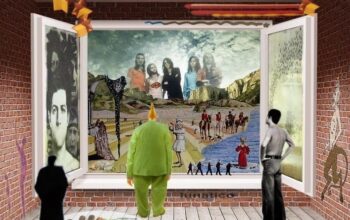U2 – Sunday Bloody Sunday (1983/2015)
Bono stands at the foot of the stage, lights down but for a single follow-spot benuding him. Giddy the spectators, he hushes them.
He claps his hands once over his head, waits three seconds, then does it again, then another three seconds, then clap, repeat. The crowd does not join in the sparse rhythm.
“Every time I clap my hands” Bono grimly declares, “a child in Africa dies”.
A lone voice from the rows closest to the stage cuts back through the silence “Well then, stop fookin’ clappin’!”
The story of course is apocryphal, long since put to lie. Its point of origin isn’t exactly known, but it started showing up in some standup routines of American comics circa 2006-7, its setting attributed as far back as U2’s performance at the Live Aid concert in Wembley twenty years earlier, which of course is nonsense. After that setting was quickly and easily fact-checked, the silly story was transplanted into other benefit concerts, until the lugnuts who perpetuated it just prefaced the joke with a much more nebulous “at some U2 concert a few years ago…”. Fake News is neither the domain of social media (in its unadopted infancy in 2006) nor of the intelligentsia.
The timing of it is conspicuous, though. Paul Hewson, supported by his mates, has always been on the vanguard of social activism. On an international scale, he has used his star power over and again to put world leaders on the spot, often in publicized-but-intimate contexts for maximum impact and lasting soundbytes on regional ENG’s. No small part of his brand was lovingly crafted by his careful and deliberate approach to pressing rich governments on policy, particularly when it came to wealth distribution and poverty. Spend more, whate’er the load, and close loopholes on your multinationals who aggressively (and legally) evade taxes. Predictably, this attitude carried well both in his politically- and socially-complicated homeland, and abroad among his young, fashionably anti-mainstream faithful.
Then in 2006, the Republic of Ireland set an exemption limit on royalties of €225,000, a miniscule fraction of the band’s massive publishing haul. Almost reflexively, U2 relocated its publishing operations to The Netherlands, where tax rates on royalties were fluid to non-existent. This was going to save U2 Ltd. a lot of money. A lot of money.
Needless to say, the blowback was abrupt and shrill. Lucky for the lads that the reportage flowed through what we now call ‘mainstream media’ and that social media still wasn’t a thing. Else, the damage might have been incalculable.
Was the criticism fair? When Hewson, Evans and other spokes for the band finally started answering for the move in the (many) years following, the rationale could have been torn out of a PR Director’s manual: U2 is a business, and all businesses operate in a ‘tax-efficient’ manner; 95% of the group’s royalties are earned outside of Ireland, so the move just reflects the band’s international positioning; U2 does pay a LOT of taxes; Google and Facebook (and other techs) have opened employment-forward operations in Ireland because of similar tax breaks, so it can be a winning formula. Womp womp.
Clearly it wasn’t illegal, and just as clearly, U2 is an operation that runs at a profit and employs people like any other business. But considering the group’s on-brand messaging and constant needling of other countries and companies performing the same shuffle, the move was utterly tone deaf.
So why am I running off on this, and what the hell does it have to do with the difference between an acoustic-versus-produced version of a song?
Stanky dust-ups like these have a way of reframing an artist’s musical messages. If they could be so hypocritical about their social activism and policy lobbies, can we really trust what their music is ‘about’? Did they mean any of it?
When the British military rolled over a demonstration of the Northern Ireland Civil Rights Association with bullets and military vehicles on Sunday January 30 1972 in Derry, leaving 13 civilians dead and another mortally wounded, the U2 Boys (see what I did just there?) were variously 10-11 years old. How well they understood The Troubles and its decades-old political and social backstory is – was – in their heads alone, but the death and the fear and terror of the incident would have been burned into the consciousness of anyone at any age. Your trusted blogger will never, not ever, forget the October Crisis of 1970, its suspension of civil rights, soldiers in the streets, terrorism and assassination. And I wasn’t nearly 10.
Sunday Bloody Sunday, penned 10 years post facto, was some dicey shit. England was at war with Argentina, the provisionary IRA was in full-throttle campaigns that had long since expanded to the British mainland, and IRA prisoner Bobby Sands had just died in a Unionist prison outside of Belfast as a result of a two-month-long hunger strike. U2 was now a fairly well-known international act, but nowhere even near the rare megastardom that was waiting for them in a few years. There was a lot to lose, and risking that path to success in your home base at age 20-21 on some incendiary and divisive song topics in an explosive time was quite, quite bold.
Think deep: what would you have written about when you were 20? If the song topic were a poignant moment from your childhood and latter-day episodes brought all those fears storming back, would some political agenda have been top-of-mind for you? Would you have brought to mind the territorial purposes of Edward Heath‘s government and the Royal Ulster Constabulary that it struggled to control? Bring it closer to home, if you must: what do you remember more, the sight of armed soldiers in fatigues and helmets on boul. St-Laurent and the open trunk of a car displaying its grim contains, or the debates over a wordy manifesto and the legitimacy of its champions? I’ll answer for myself: No. I’d remember my fear, and the wish that it would end. I’d remember the realness of death and all its attending terror. And I’d readily trade the assignment of blame for the guarantee that there would be an end to it all.
Well, that’s what the song is about. Two English-born and two Irish-born artists delivered a song told in the first person recalling the shock of an event from which they shared one takeaway: make it stop.
Arguably, this is U2’s signature song. If you asked a thousand U2 fans to list their most identifiable piece, Sunday might register half the hits. It dropped just three years into the band’s meteoric career, and so it’s enjoyed a long stay. And like any early arrival, the song has gone through many adjustments in live performance over the years. When you perform a song thousands of times, you want to keep things fresh.
So, how did this song evolve for the band over the years, and when they stripped it right down to its humble acoustic beginnings, what was the musical message they couldn’t abandon?
Listen to the recorded version first.
It’s a complicated bit of business, isn’t it? The first thing we hear is a military-style snare. Dwell on that. That’s the first voice they wanted to tell this story with. And it stays throughout the song. We’re in a war zone.
Lyrically, the hero of the first verse might be the line
I can’t close my eyes and make it go away
But nothing highlights it; it’s smoothly buried into the second line of a stanza, between incredulity (“I can’t believe the news today”) and exasperation (“How long must we sing this song?”), and washed over by the fife and drum of a severe guitar and even-more severe one-drum beat. In aggregate, it’s just a catchy rock tune streaked with military anger. Black Sabbath (Sabbath Bloody Sabbath) and John and Yoko (Sunday Bloody Sunday) each riffed on the same theme ten years earlier with a much sharper purpose.
The violin prefacing the second verse (at 1:30) presents a second player in the theatre, an ethnomusical character depicting the plainfolk, the civilian element. Interrupted by a melodramatic instrumental bridge, it sings us a mix of marcato punches and crying glissandi. That interruption is no accident. At some point in the story, the bullets fly, the protesters scramble, the folk are felled. The violin has no voice and the ham-handed guitar solo takes over the soundscape, the military drum stubbornly beating on. All of that uncommon instrumentation, itself is a story within the story, depict two belligerents competing for our ear, while the singing voices, almost lost in all of this absent the ‘Sunday Bloody Sunday’ refrain, lays out the senselessness of the the human tragedy.
Now listen to this acoustic version from the acoustic sessions of Songs of Innocence.
This is just Bono, The Edge and Adam Clayton. Two guitars, two voices. There’s no military snare, no violin, the combatants are gone. All that’s left is the wistful recall of a horrible event by two singers who were eleven years old and terrified. In the 1983 recorded version, the climax of the song is the end of the bridge, the third verse and its refrain with the perverse juxtaposition of the violin over the snare. Here, with just the lyrical narrative and its accompaniment and the instrumental subtexts stripped away, the zenith of the song is the collision of the dueling voices, Bono and The Edge, on “We will be as one” (2:26). The same substance, but in its rendering a very, very different message than the original.
U2 has played many versions of this song over the decades in various settings and arrangements, and even with various versions of the text (indeed, you might have noticed the altered final verse of the acoustic session above). In some live performances, they’ve remained faithful to the recording and delivered with full power; in others, they’ve played it unplugged but kept Mullen‘s military snare, if for no other reason than the added energy it gives in a full stadium concert. And in others still, it’s just the guitars and the voices.
The song’s range and pliability is striking. In its full service, the instrumental texture carries the story. Stripped down, the lyric word and its tone painting carry the message. But whether the song is screamed or whispered, whether it was played for €150 or for free on a podcast, its message doesn’t change. The impressions and memories of children hearing about senseless death and terror are exactly what we’re supposed to hear.
It’s a sincere message from sincere messengers. Now get off their asses about taxes.



